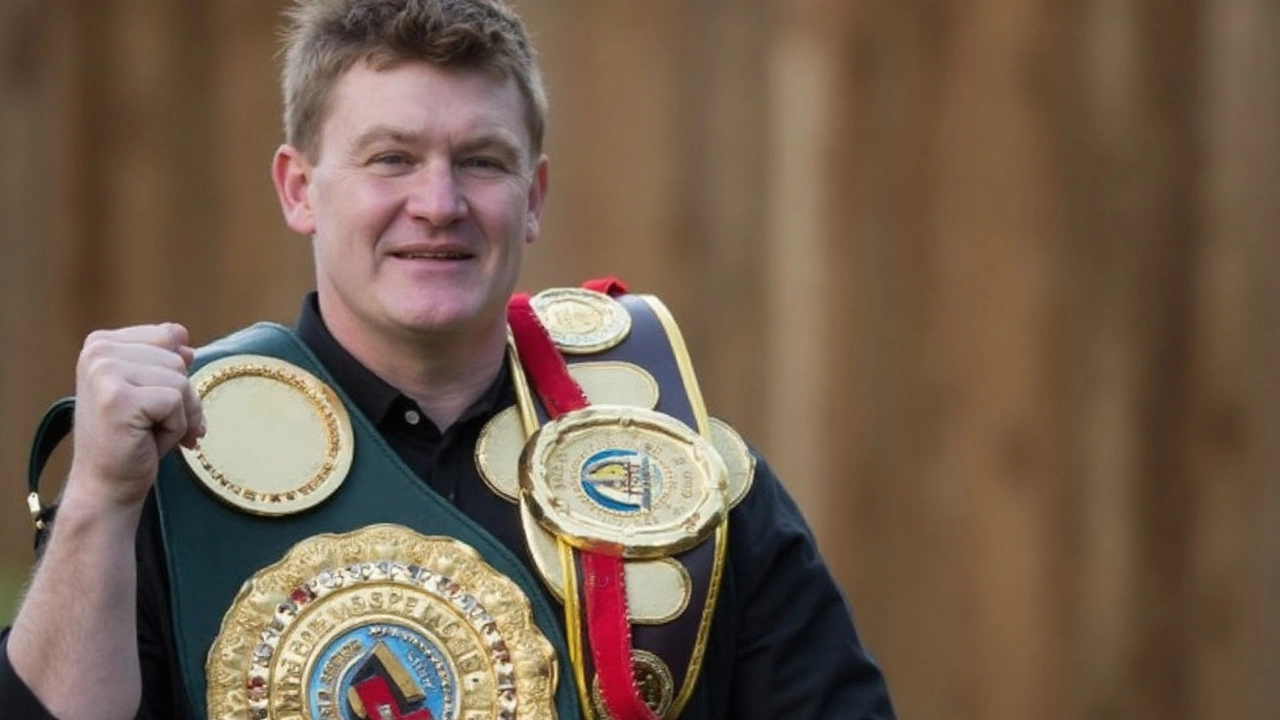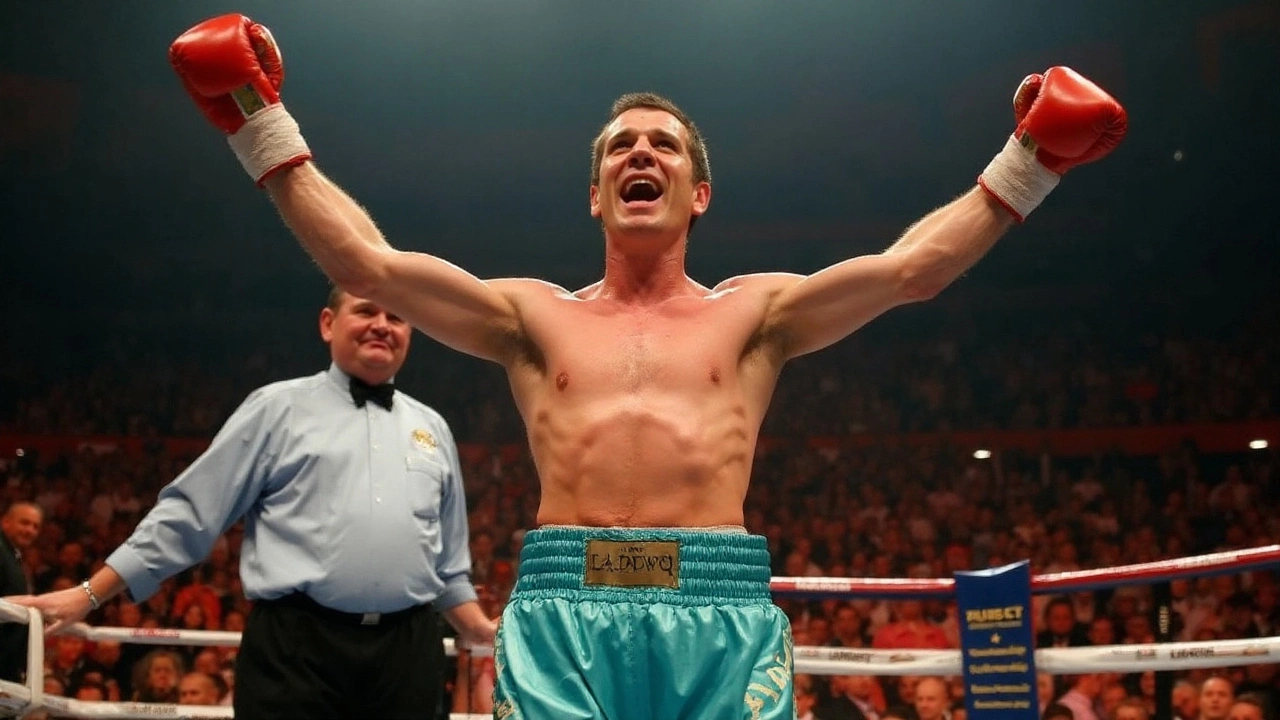Ricky Hatton never needed an introduction—just the first chords of Blue Moon and a sea of sky-blue shirts told you who was coming. The Manchester idol, who died in September 2025 aged 46, built one of the loudest fan movements British sport has ever seen and fought his way to world titles in two divisions. At the time of writing, no cause of death has been made public. What endures is clear: few fighters blended raw grit, crowd-pulling charisma, and big-night drama the way he did.
A career built on grit and thunderous nights
Hatton turned professional in 1997 with the kind of all-action style UK fans instantly latch onto—relentless pressure, swarming footwork, and a left hook to the body that stole air from opponents. Raised in Hyde, Greater Manchester, he came up under trainer Billy Graham at the famed Phoenix Camp, learning to close distance and stay inside a phone booth without getting dragged into chaos.
His climb was steady and noisy. He won the British light-welterweight title in 2000, then grabbed the WBU belt in 2001 and defended it a remarkable 15 times. Purists rolled their eyes at the belt’s prestige, but Hatton used that stretch the smart way: staying busy, selling out arenas, and sharpening the tools he’d need for the elite level. Manchester Arena became his second home, and each defense felt like a local holiday.
The night that changed everything landed in 2005. Facing Kostya Tszyu—a long-reigning, pound-for-pound star—Hatton boxed with discipline and bullied at close range, forcing a stoppage when Tszyu retired on his stool after the 11th round. The fight, staged in Manchester in the early hours to suit US TV, crowned Hatton the IBF, Ring, and lineal champion at 140 pounds. Later that year, he beat Carlos Maussa to add the WBA title and become a unified champion. Voters took notice: he swept Fighter of the Year honors from The Ring, the Boxing Writers Association of America, and ESPN.
He chased bigger challenges in 2006, moving up to welterweight to edge Luis Collazo for a world title in a rugged, close fight that tested him late. The message was simple: he could carry his pressure and punch wherever he went. Back at light-welterweight in 2007, he outpointed Juan Urango in Las Vegas to win the vacant IBF title again and added the IBO belt for good measure. Two months later, he folded Jose Luis Castillo with a trademark liver shot—a one-punch finish that still shows up on highlight reels.
By the end of 2007, he was the man everyone wanted to see. Then came Floyd Mayweather Jr. in Las Vegas, with tens of thousands of British fans flooding the Strip like a traveling football derby. Mayweather’s counterpunching cracked Hatton’s pressure code, and the American won by 10th-round TKO. The defeat cut deep. Hatton rebuilt, outdrawing football crowds when he fought Juan Lazcano in front of around 55,000 at the City of Manchester Stadium in 2008, then boxed smoothly to stop Paulie Malignaggi later that year with Floyd Mayweather Sr. in his corner.
The Manny Pacquiao fight in 2009 was the other hard fall. Pacquiao ended it inside two rounds in a brutal finish, costing Hatton his IBO, Ring, and lineal titles at 140. The loss wasn’t just a mark on the record; it shook him. He stepped away, teased retirement in 2011, then returned once more in 2012 after more than three years out. For a few minutes against Vyacheslav Senchenko, the old engine roared. Senchenko’s body shot closed the book, and Hatton announced his final retirement on the spot.
When the dust settled, his ledger read 45 wins, 3 losses, with dozens of sold-out nights and a stack of belts that told the real story: he’d climbed to the very top, and he brought a nation with him.
- Pro debut: 1997
- British champion: 2000
- WBU reign: 2001–2004 (15 defenses)
- Unified at 140 lbs: 2005 (IBF, Ring, lineal; later WBA)
- Welterweight world title: 2006
- Major Vegas nights: Mayweather (2007), Malignaggi (2008)
- Final fight: 2012

After the bell: the promoter, trainer and mental health advocate
Hatton didn’t leave boxing; he just switched corners. Through Hatton Promotions and his Manchester gym, he trained and guided prospects and champions, including his son, Campbell, who followed him into the pro ranks. He worked corners on small-hall shows and big nights, the same way he fought—up close, sleeves rolled, all-in.
He talked openly about what many keep hidden: depression, binge drinking, and the crash that can follow the roar of a crowd. In interviews and public appearances, he urged people to speak up and seek help. Schools, amateur gyms, and community groups heard the same message from him: tough doesn’t mean silent. That honesty earned him a different kind of respect—one that outlasts belts.
Fans loved the fighter; they adored the person. Hatton embraced the “Ricky Fatton” jokes about his off-season weight and wore his working-class roots with pride. He walked out to Blue Moon, draped in Manchester colors, and he made arenas feel like home games. When British fans crossed the Atlantic by the tens of thousands, they didn’t just travel—they carried the soundtrack of a city with them.
He even laced them up for an exhibition at home in 2022, trading leather with Marco Antonio Barrera for the joy of it and reminding everyone why those nights felt special. It wasn’t about rankings or politics. It was about the buzz you get when a whole arena leans forward together.
Tributes have poured in since his death—from rivals who shared the ring, from fighters who sold out arenas because he proved Brits could do it in America, and from the fans who made weekend pilgrimages to watch him fight. Hatton once said he might not be the greatest British champion ever, but there hadn’t been a British world champion with a fan base like his. He was right. The noise he made never really stopped; it just lives on in the people who still hum his walkout tune.
